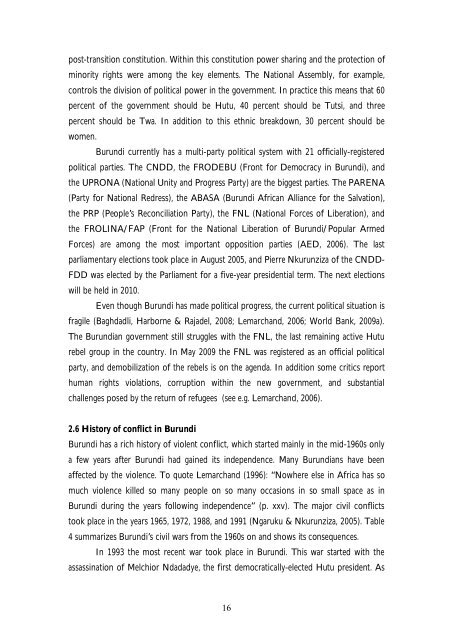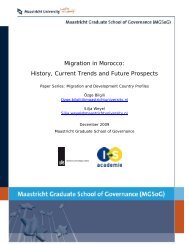Migration in Burundi: History, Current Trends and Future - MGSoG ...
Migration in Burundi: History, Current Trends and Future - MGSoG ...
Migration in Burundi: History, Current Trends and Future - MGSoG ...
You also want an ePaper? Increase the reach of your titles
YUMPU automatically turns print PDFs into web optimized ePapers that Google loves.
post-transition constitution. With<strong>in</strong> this constitution power shar<strong>in</strong>g <strong>and</strong> the protection of<br />
m<strong>in</strong>ority rights were among the key elements. The National Assembly, for example,<br />
controls the division of political power <strong>in</strong> the government. In practice this means that 60<br />
percent of the government should be Hutu, 40 percent should be Tutsi, <strong>and</strong> three<br />
percent should be Twa. In addition to this ethnic breakdown, 30 percent should be<br />
women.<br />
<strong>Burundi</strong> currently has a multi-party political system with 21 officially-registered<br />
political parties. The CNDD, the FRODEBU (Front for Democracy <strong>in</strong> <strong>Burundi</strong>), <strong>and</strong><br />
the UPRONA (National Unity <strong>and</strong> Progress Party) are the biggest parties. The PARENA<br />
(Party for National Redress), the ABASA (<strong>Burundi</strong> African Alliance for the Salvation),<br />
the PRP (People’s Reconciliation Party), the FNL (National Forces of Liberation), <strong>and</strong><br />
the FROLINA/FAP (Front for the National Liberation of <strong>Burundi</strong>/Popular Armed<br />
Forces) are among the most important opposition parties (AED, 2006). The last<br />
parliamentary elections took place <strong>in</strong> August 2005, <strong>and</strong> Pierre Nkurunziza of the CNDD-<br />
FDD was elected by the Parliament for a five-year presidential term. The next elections<br />
will be held <strong>in</strong> 2010.<br />
Even though <strong>Burundi</strong> has made political progress, the current political situation is<br />
fragile (Baghdadli, Harborne & Rajadel, 2008; Lemarch<strong>and</strong>, 2006; World Bank, 2009a).<br />
The <strong>Burundi</strong>an government still struggles with the FNL, the last rema<strong>in</strong><strong>in</strong>g active Hutu<br />
rebel group <strong>in</strong> the country. In May 2009 the FNL was registered as an official political<br />
party, <strong>and</strong> demobilization of the rebels is on the agenda. In addition some critics report<br />
human rights violations, corruption with<strong>in</strong> the new government, <strong>and</strong> substantial<br />
challenges posed by the return of refugees (see e.g. Lemarch<strong>and</strong>, 2006).<br />
2.6 <strong>History</strong> of conflict <strong>in</strong> <strong>Burundi</strong><br />
<strong>Burundi</strong> has a rich history of violent conflict, which started ma<strong>in</strong>ly <strong>in</strong> the mid-1960s only<br />
a few years after <strong>Burundi</strong> had ga<strong>in</strong>ed its <strong>in</strong>dependence. Many <strong>Burundi</strong>ans have been<br />
affected by the violence. To quote Lemarch<strong>and</strong> (1996): “Nowhere else <strong>in</strong> Africa has so<br />
much violence killed so many people on so many occasions <strong>in</strong> so small space as <strong>in</strong><br />
<strong>Burundi</strong> dur<strong>in</strong>g the years follow<strong>in</strong>g <strong>in</strong>dependence” (p. xxv). The major civil conflicts<br />
took place <strong>in</strong> the years 1965, 1972, 1988, <strong>and</strong> 1991 (Ngaruku & Nkurunziza, 2005). Table<br />
4 summarizes <strong>Burundi</strong>’s civil wars from the 1960s on <strong>and</strong> shows its consequences.<br />
In 1993 the most recent war took place <strong>in</strong> <strong>Burundi</strong>. This war started with the<br />
assass<strong>in</strong>ation of Melchior Ndadadye, the first democratically-elected Hutu president. As<br />
16



